Chief Albert Luthuli Research Chair
Unisa @ 150: Historic transformative research charter launched
On 5 July 2023, Prof Puleng LenkaBula, Principal and Vice-Chancellor of the University of South Africa (Unisa), together with Prof Puleng Segalo, incumbent of the Chief Albert Luthuli Research Chair at the university, formed part of the historic launch of an Africa Charter for advancing transformative research collaborations between Africa and the rest of the world.
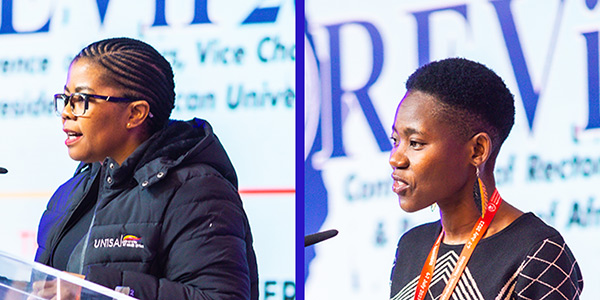
Speaking at the historic launch were Prof Puleng LenkaBula, Unisa Principal and Vice-Chancellor, and Prof Puleng Segalo, incumbent of the Chief Albert Luthuli Research Chair at the university
The ambitious Charter Initiative is being co-created by Africa’s major higher education bodies and facilitated by the Perivoli Africa Research Centre at the University of Bristol in partnership with the Chief Albert Luthuli Research Chair at Unisa and the Institute for Humanities in Africa at the University of Cape Town.
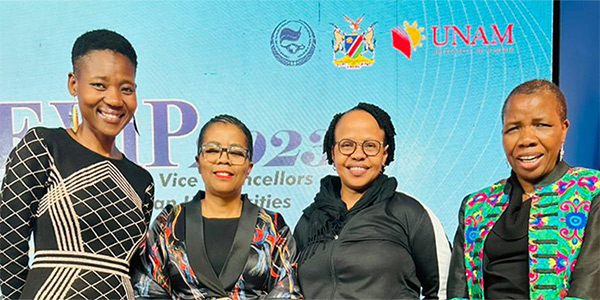
The Unisa delegation, from left: Prof Puleng Segalo, incumbent of the Chief Albert Luthuli Research Chair; Prof Puleng LenkaBula, Unisa Principal and Vice-Chancellor; Prof Thenjiwe Meyiwa, Vice-Principal: Research, Postgraduate Studies, Innovation and Commercialisation; and Prof Azwihangwisi Helen Mavhandu-Mudzusi, Head of Research and Graduate Studies in the College of Human Sciences
The launch took place in Namibia at the Windhoek Country Club, and formed part of the 2023 Conference of Rectors, Vice-Chancellors and Presidents of African Universities, co-hosted by the Association of African Universities and the University of Namibia. The Unisa delegation also included Prof Thenjiwe Meyiwa, Vice-Principal: Research, Postgraduate Studies, Innovation and Commercialisation, and Prof Azwihangwisi Helen Mavhandu-Mudzusi, Head of Research and Graduate Studies in the College of Human Sciences.
A staggering 84 vice-chancellors, rectors and university presidents from different universities and other higher education organisations signed the Charter, thus committing to a set of principles for policy reform and to effect change in international cooperation. This new approach is set to rebalance and enrich the science and research ecosystem.
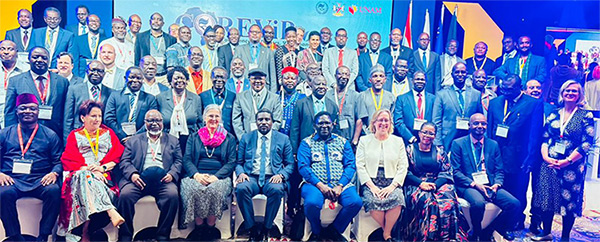
Attendees at the 2023 Conference of Rectors, Vice-Chancellors and Presidents of African Universities
It aims to redress entrenched power imbalances in global knowledge production. These historic disparities have fuelled a huge gap between universities and scholars in Europe, North America and Australia, and their African counterparts.
The key goals of the Charter include creating a radically new approach to research collaboration that redresses deep-seated divides in the generation of scientific knowledge, championing this reformed, equitable way of working as standard and best practice, and introducing an Africa-centred framework setting out guiding principles and measures of success and accountability.
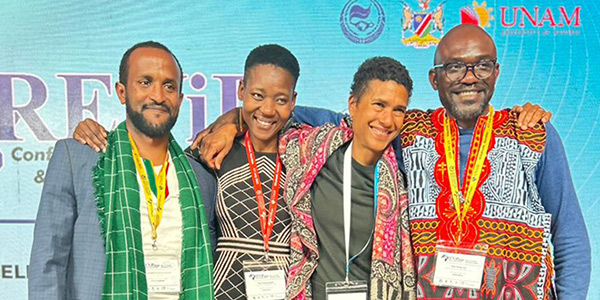
The leaders and initiators of the Africa Charter, from left: Dr Eyob Gebremariam, Postdoctoral Fellow, Perivoli Africa Research Centre, University of Bristol; Prof Puleng Segalo, incumbent of the Chief Albert Luthuli Research Chair; Prof Isabella Aboderin, incumbent of the Perivoli Chair in Africa Research and Partnerships, University of Bristol; and Associate Professor Divine Fuh, Director of the Institute for Humanities in Africa, University of Cape Town
In her address, LenkaBula said: "This charter effectively creates a platform for Africa and her people to redefine, redraw and reframe collaborations to reflect the spirit of mutual respect, shared vision and shared aspirations of participants: a true reflection of Africanism finding global expression." She continued: "This is a radical Charter and moment in history where a broad range of African people gain agency to determine their own futures at all levels. In this way, Africa’s agency will be fully recognised, reinforced, and protected for achieving the envisioned Afro-futures."
LenkaBula also said that the charter underscores the need for African universities and scholars to take charge of their research and publishing agenda, ensuring that it reflects their unique values and aspirations. "Guided by the United Nations’ Sustainable Development Goals," she concluded, "this charter stands for equitable global partnerships to promote social and epistemic justice, and strong institutions by dismantling and significantly reducing one-sided partnerships that only serve the North’s global interests with a colonial undertone that dismisses the contributions from Africa, viewing Africa as mere receptors of knowledge and financial aid. We will need to be unapologetic about delving deep into the traditions of knowledge emerging from the African continent while interacting with the world based on this intellectual heritage."
Speaking next, Segalo said: "This Charter signifies a moment for Africa to assert its vision on how collaborations need to unfold and, doing so, recognising the power vested in the continent. We acknowledge that even though there has been quite a lot of work done on equitable partnerships, most efforts focus mainly on the symptoms and not the core issues." She continued: "We hope that through this Charter, there will be a shift in decision making and actioning of these decisions where power does not lie in the Global North only but within the continent itself – to strive towards intellectual and economic agency."
Segalo said that research collaborations are important, and have the potential to engender change in the rebalancing of the global science system. "They have the potential to be transformative. This would require a mode of collaboration that is oriented explicitly to redressing the fundamental power imbalances in knowledge production at various levels."
She concluded: "With this charter, we call for embedding or institutionalising a more transformative collaboration mode which would require a complex change in how we approach research partnerships."
#Unisa 150
* By Edgar Rathelele, Senior Media Officer, Department of Institutional Advancement
Publish date: 2023-07-11 00:00:00.0

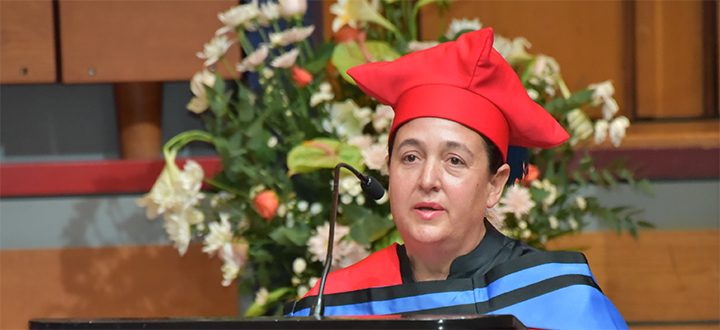 Unisa confers honorary doctorate on renowned restaurant mogul, Natasha Sideris
Unisa confers honorary doctorate on renowned restaurant mogul, Natasha Sideris
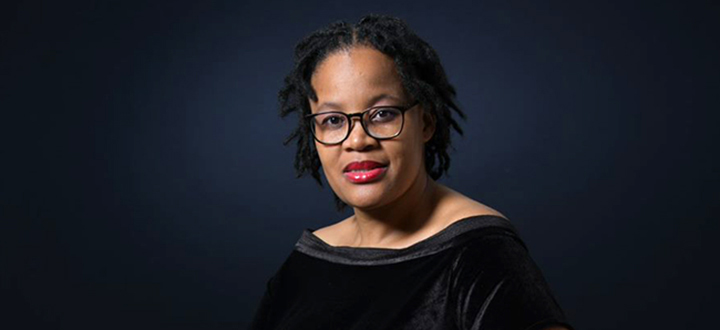 What do early-career researchers really need?
What do early-career researchers really need?
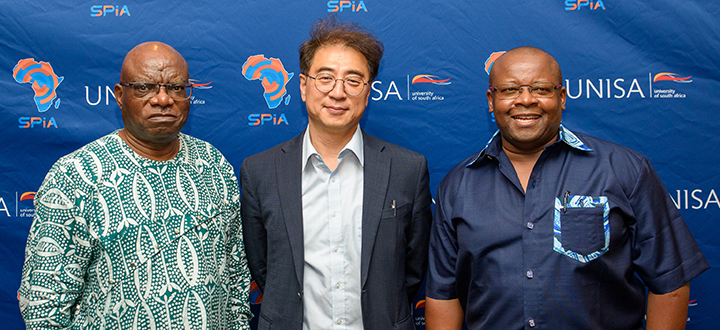 New directions in social policy and alternative economies: Lessons from and for developing countries
New directions in social policy and alternative economies: Lessons from and for developing countries
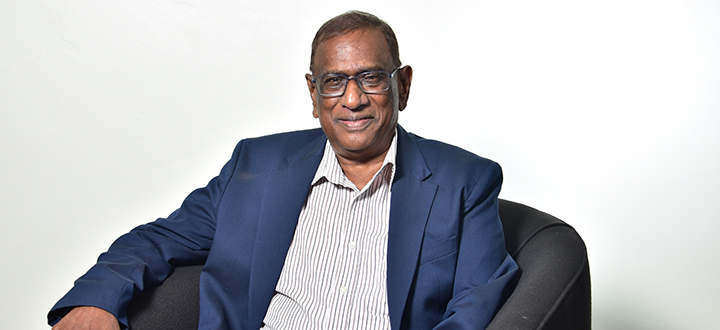 Seeds of curiosity: From DNA to dinner plate
Seeds of curiosity: From DNA to dinner plate
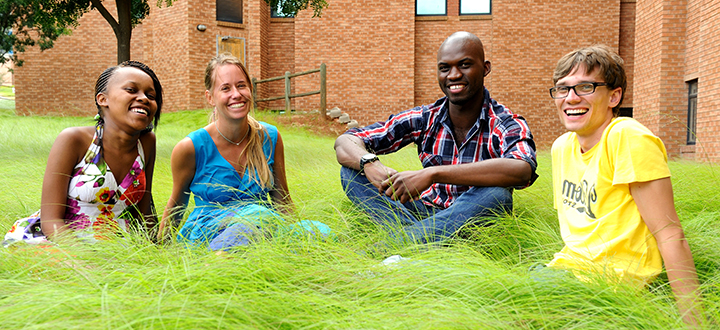 Unisa MOOC magic enhances student transition to higher education
Unisa MOOC magic enhances student transition to higher education